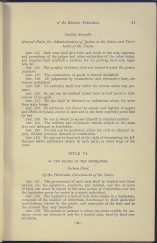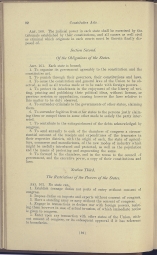

OF THE STATES OF THE FEDERATION.
Of the Particular Government of the States.
Article 157. The government of each state shall be divided into three powers, viz: the legislative, executive, and judicial, and two or more of these can never be united in the same person or corporation, nor can the legislative power be vested in a single individual
Article 158. The legislative power of each state resides in a legislature, composed of the number of individuals determined by their particular constitutions, elected by the people, and removable at the time and in the manner they may prescribe.
Article 159. The legislative power of each state resides in a legislature, composed of the number of individuals determined by their particular constitutions, elected by the people, and removable at the time and in the manner they may prescribe.
Article 160. The judicial power in each state shall be exercised by the tribunals established by their constitutions, and all causes as well civil as criminal which originate in such courts must, be therein finally disposed of.
(Transcription, errors in original preserved)

Of the Obligations of the States.
Article 161. Each state is bound:
1st. To organize its government agreeably to the constitution and the constitutive act.
2d. To punish through their governors, their constitutions and laws.
3d. To cause the constitution and general laws of the Union to be observed, as well as all treaties made or to be made with foreign powers.
4th. To protect its inhabitants in the enjoyment of the liberty of writing, printing and publishing their political ideas, without license, or previous revision or approbation, causing however the laws relative to this matter to be duly observed.
5th. To surrender criminals to the governments of other states, claiming them.
6th. To surrender fugitives from other states to the persons justly claiming them or compel them in some other mode to satisfy the party interested.
7th. To contribute to the extinguishment of the debts acknowledged by congress.
8th. To send annually to each of the chambers of congress a circumstantial account of the receipts and expenditures of the treasuries in their respective districts, with the origin of each, the state of agriculture, commerce and manufactures, of the new modes of industry which might be usefully introduced and protected, as well as the population and the means of protecting and augmenting the same.
9th. To forward to the chambers, and in the recess of the council of government, and the executive power, a copy of their constitutions and laws.
(Transcription, errors in original preserved)

The Restrictions of the Powers of the States.
Article 162. No state can,
1st. Establish tonnage duties nor ports of entry without consent of congress.
2d. Impose duties on imports and exports without consent of congress.
3d. Have a standing army or navy without the consent of congress.
4th. Engage in transactions or declare war with foreign powers, resisting them however in case of actual invasion, of which immediate notice is given to congress.
5th. Enter upon any transaction with other states of the Union, without consent of congress, or its subsequent approval if it has reference to boundaries.
(Transcription, errors in original preserved)

